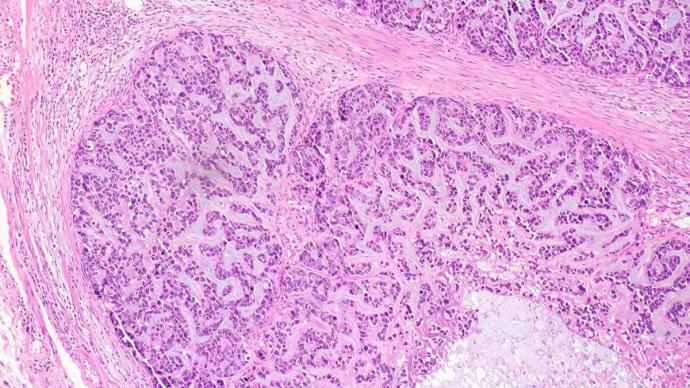
Recently, the British Journal of Cancer and the British Cancer Research Center jointly published the research results of the research team of Li Zhiyuan, a researcher at the Guangzhou Institute of Biomedicine and Health of the Chinese Academy of Sciences. They not only revealed the important role of transient receptor potential ion channel vanilloid subtype 2 (TRPV2) channel in the occurrence and development of esophageal squamous cell carcinoma, but also proposed a new direction for the prevention and treatment of esophageal squamous cell carcinoma.
The study found for the first time that repeated heating or agonist action of heat-sensitive TRPV2 can activate the HSP70/27 and PI3K/Akt/mTOR signaling pathways, significantly promoting the malignant behavior of esophageal squamous cell carcinoma in vitro and in vivo. tumorigenesis and spread.
It is known that the incidence and progression of esophageal squamous cell carcinoma are related to polygenic abnormalities, and external environmental factors, especially high-temperature diet, are considered to be one of the main risk factors for esophageal squamous cell carcinoma. In fact, hyperthermia has been listed as one of the causes of esophageal squamous cell carcinoma by the International Agency for Research on Cancer, however, its underlying molecular mechanism is still poorly understood.
To this end, based on years of research on transient receptor potential ion channels (TRP), Li Zhiyuan's team first detected the expression and function of thermosensitive TRPV in human esophageal squamous epithelial cells, and found that compared with non-tumor tissue, ESCC cells and The expression of TRPV2 in clinical ESCC samples was significantly up-regulated, and its functional activity was confirmed by calcium imaging experiments.
Further studies have found that short and frequent thermal stimulation of ESCC cells at a temperature that activates TRPV2 channels (54°C) can significantly enhance the proliferation, invasion, and angiogenesis of ESCC cells in vitro. The experiment can significantly promote the tumorigenesis of nude mice and the tumor metastasis by tail vein injection, indicating that overexpression and overactivation of TRPV2 can turn non-tumor cells into tumorigenesis.
Notably, the study found that TRPV2 channels were activated at a temperature of 54°C, which is lower than the dietary temperature for many people and well below the high-temperature dietary risk temperature recommended by the International Agency for Research on Cancer (65°C). Therefore, this study proposes a new direction for the prevention and treatment of esophageal squamous cell carcinoma .
Related paper information:
https://doi.org/10.1038/s41416-022-01896-2
(Original title "The molecular mechanism of esophageal squamous cell carcinoma caused by "eat while hot" is revealed")
The study found for the first time that repeated heating or agonist action of heat-sensitive TRPV2 can activate the HSP70/27 and PI3K/Akt/mTOR signaling pathways, significantly promoting the malignant behavior of esophageal squamous cell carcinoma in vitro and in vivo. tumorigenesis and spread.
It is known that the incidence and progression of esophageal squamous cell carcinoma are related to polygenic abnormalities, and external environmental factors, especially high-temperature diet, are considered to be one of the main risk factors for esophageal squamous cell carcinoma. In fact, hyperthermia has been listed as one of the causes of esophageal squamous cell carcinoma by the International Agency for Research on Cancer, however, its underlying molecular mechanism is still poorly understood.
To this end, based on years of research on transient receptor potential ion channels (TRP), Li Zhiyuan's team first detected the expression and function of thermosensitive TRPV in human esophageal squamous epithelial cells, and found that compared with non-tumor tissue, ESCC cells and The expression of TRPV2 in clinical ESCC samples was significantly up-regulated, and its functional activity was confirmed by calcium imaging experiments.
Further studies have found that short and frequent thermal stimulation of ESCC cells at a temperature that activates TRPV2 channels (54°C) can significantly enhance the proliferation, invasion, and angiogenesis of ESCC cells in vitro. The experiment can significantly promote the tumorigenesis of nude mice and the tumor metastasis by tail vein injection, indicating that overexpression and overactivation of TRPV2 can turn non-tumor cells into tumorigenesis.
Notably, the study found that TRPV2 channels were activated at a temperature of 54°C, which is lower than the dietary temperature for many people and well below the high-temperature dietary risk temperature recommended by the International Agency for Research on Cancer (65°C). Therefore, this study proposes a new direction for the prevention and treatment of esophageal squamous cell carcinoma .
Related paper information:
https://doi.org/10.1038/s41416-022-01896-2
(Original title "The molecular mechanism of esophageal squamous cell carcinoma caused by "eat while hot" is revealed")
Related Posts
Write A Comments
You said it very well.! casino en ligne Nicely put, Cheers. casino en ligne Wow lots of very good information! casino en ligne Truly lots of excellent tips. casino en ligne Thank you. Fantastic stuff. casino en ligne Wonderful stuff. Appreciate it! casino en ligne Many thanks! Numerous advice! casino en ligne Amazing data, Many thanks. casino en ligne Very good write ups, With thanks! casino en ligne You have made the point. casino en ligne